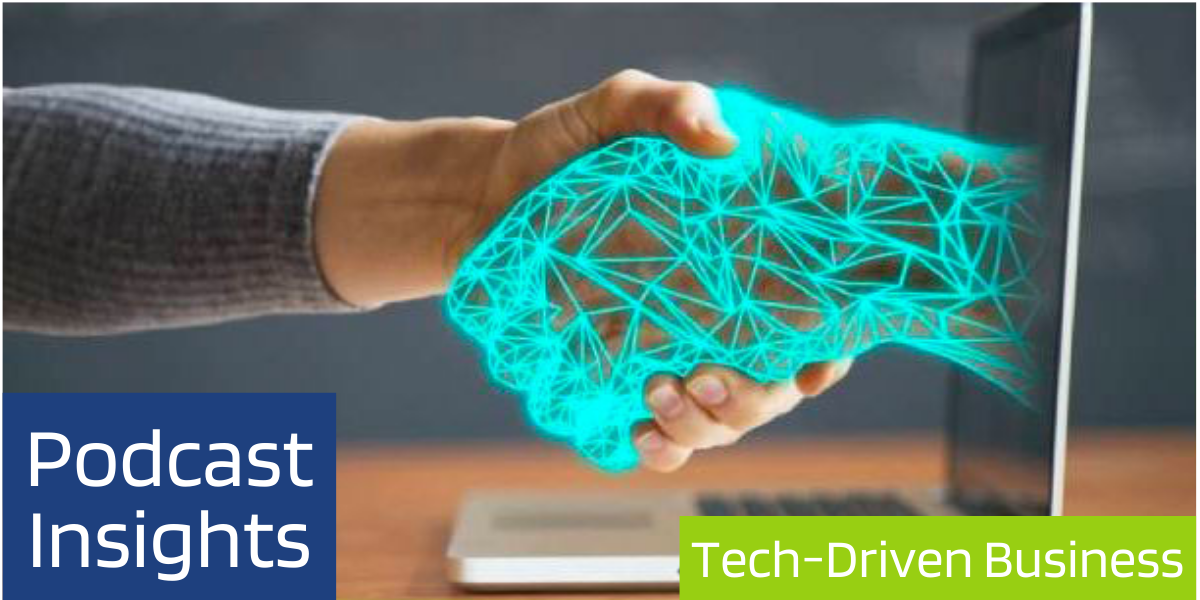By Mariyah Saifuddin

Bill Newman of SAP first joined us in 2021 to talk about the Future of Work and the Next Generation Workforce. At the time we were in the midst of a pandemic and organizations were striving to find ways to not only adjust but to grow. Fast forward to 2023, and Bill rejoins our Tech-Driven Podcast to highlight what has happened since our conversation two years ago and what the future looks like.
This is the latest in a series of podcasts on the future of work.
What has changed since 2021
Working differently: One of the biggest changes is the move to virtual from in person. As Newman says: “In many cases it’s de facto. Whereas prior to the pandemic, we would say, tell me why we can’t get together face to face. The thinking now is, tell me why we can’t do this virtually.”
Work-life balance: Not only have people enjoyed having the technology to work remotely, but they also like that they do not have to spend hours commuting. According to Newman: “It’s even gotten to a point where a lot of our customers have asked their employees, tell me what days you would be willing to come into the office. And no big surprise, very few people lift their hand on Monday and Friday because they would like to spend those days at least working from home. But interestingly, everybody coming into the office on Wednesdays just creates the same traffic nightmare and parking anxiety that everybody had prior to the pandemic.”
Employee engagement: Newman says what has changed here is how companies engage with people in terms of how they bring them into the company and what their expectations are of them once they’re in the company. Employees no longer must live close to the office. With options for remote work, many are reprioritizing what is important for them in a job.
Looking forward: A focus on manufacturing
Workforce planning: There has been a significant amount of hiring, and that will continue. There is and will be a need for people with both skilled trades as well as higher education — engineering especially. “This idea of where you work and where you live is now disassociated,” Newman says, “and what that does is it creates a lot of competitiveness across industries and across industry sectors.”
How we interview: Companies need to figure out the talent requirements needed and if positions require being face to face well before the hiring process. Onboarding and hiring processes need to be compressed, particularly given this talent shortage.
The role of Diversity, Equity and Inclusion: According to Newman, “With over 60% of companies now in the automotive supplier space, over 60% of them are showing improvement or acceleration in those programs.”
It is more than just a diverse workforce from a cultural, race, or gender perspective, Newman says. It’s about extending that to socioeconomic and cultural background and making sure that those DEI elements not only apply to new talent acquisition, but also to high potential programs to work shift opportunities.
Overall, Newman says that while manufacturing is going to be significantly short on effective and productive talent, we will see a desire to keep people happy, to keep them motivated, and to keep them performing at very high levels with very high intrinsic value.
3 roles SAP has had in retooling the workforce
- Qualtrics supports organizations with their employee relationship, especially as it helps them do “pulse surveys” to get a sense of how employees are feeling. From an HR perspective, although onboarding tools and career management of employees have existed, Newman says they will gain a higher level of importance.
- Open SAP offers many opportunities for education, free of charge in many cases.
- SAP ASUG: not only allows for personal learning but for experiential learning and sharing best practices.
Interested in more Tech-Driven Business podcasts? You can listen here
About Bill Newman
 William Newman is an industry executive advisor (chief) for SAP’s Customer Innovation Office. He has more than 35 years of executive leadership, strategy, consulting, practice management experience balanced with extensive public speaking and higher education experience.
William Newman is an industry executive advisor (chief) for SAP’s Customer Innovation Office. He has more than 35 years of executive leadership, strategy, consulting, practice management experience balanced with extensive public speaking and higher education experience.
A former leadership team member for Volkswagen’s IT division, he is the author of two books on enterprise performance and has worked with many OEMs and suppliers across the automotive industry.
Additional resources
Looking back 2 years: The original two-part Future of Work podcast series with Bill Newman
SAP’s Talent Management System (TMS): An integrated software platform that supports core talent management processes such as recruitment, employee onboarding, performance management, learning and professional development, compensation management and succession planning.
Human capital management (HCM): A broad set of practices and applications for recruiting, managing, and developing a company’s workforce. SAP’s HR software integrates processes and competencies throughout the employee lifecycle.

